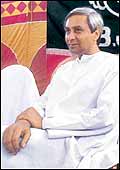|
If
there's one sector that finally looks set to find its place in the
sun, it's media. Advertising revenues are looking good-analysts
expect a 12 per cent growth for the industry in 2003, as against
a practically flat market last year-and the stockmarkets never looked
as buoyant in a long time.
For an industry that's accustomed to revenue-raising
constraints in the midst of a highly-competitive scenario, a flourishing
secondary market is indeed good news for growth-hungry promoters.
''I expect plenty of IPOs (initial public offerings) by media companies
in the near future. That's because their funding compulsions are
high, and the cost of funds has always been higher for media firms
because of the risk premium they attract. So equity financing is
the best option for these companies,'' explains Shubabrata Majumdar,
Motilal Oswal's media-tracking equity analyst.
First off the blocks is TV Today Network, which
owns Aaj Tak and Headlines Today (and is also a part of the group
that publishes BT). The leader in the news space will raise Rs 100-120
crore via a public issue of 14.5 million shares (face value of Rs
5; it will take the book-building route). Says G. Krishnan, CEO,
TV Today Network: ''Being the market leaders, our objective now
is to raise resources for faster growth. We want to increase our
viewership even as we hold on to our existing loyal audience.''
For the year ended March 2003, TV Today's profits
recorded an almost 10-fold spurt, to Rs 26 crore. Krishnan attributes
this rapid growth to various initiatives, including incentivised
rate cards for existing advertisers as well as aggressive moves
to convince hitherto non-news advertisers to advertise on Aaj Tak
and Headlines Today.
To be sure, TV Today won't be the only equity-raising
media company. Analysts point out that implementation of the conditional
access system (CAS) is inevitable, and will happen in 12-18 months.
What''s more, creating DTH and hits infrastructure will also call
for considerable investments.
Investment bankers point out that a number
of broadcasting majors like NDTV, B4U and UTV, which were actively
considering going public a few years ago, could once again reignite
their plans for the primary market. Sony, too, on the back of the
cricket rights it has in the bag till the next World Cup as well
as blockbuster serials like Jassi Jaissi Koi Nahin (it opened in
the top 50 serials by rating points, an achievement for the channel)
would find this an opportune time to raise money from the public.
Meantime M&A activity could also step up
in the print medium, what with the cash-rich Bennett Coleman group
eyeing prospective targets. And of course foreign investment has
only just begun trickling in. The flood could well be on its way.
-Brian Carvalho
BT-CIRRUS
A Bitter Bite
Worms eat into Cadbury's traditionally positive
image.
Brand
equity can be a very fragile thing. Just ask Cadbury. Until September
this year, it was one of the most loved chocolate brands in the
country. Come October, it had even the most abject chocolate slave
worried. Why? Blame it on worms-the ones found in Cadbury chocolates
by the Maharashtra Food and Drug Administration. While in the past,
Cadbury has almost always received positive press (the BT-Cirrus
data, however, pertains to May-October 2003), the coverage it received
in October was overwhelmingly negative. That worms were found in
Cadbury chocolates was bad enough, but the company made it worse
by laying the blame squarely at its retailers. In fact, the company's
Managing Director, Bharat Puri, even asked consumers to be careful
about where they bought Cadbury chocolates. In doing so, he forgot
two things: One that the retailer was appointed by the company and
hence it was equally responsible in ensuring proper storage of chocolates.
Two, consumers put their trust in Cadbury and not the retailer.
No doubt Cadbury will recover from all the drubbing. But had the
company handled the crisis better, it may have actually ended up
with a better image.
1.Visibility scores and image scores measure
all news items. Visibility scores are a factor of the size of
the article multiplied by the readership of the given newspaper
or magazine where the article has appeared.
2. Image scores are the tonality of a given
news item. The visibility scores are
multiplied by one, two or minus one depending on whether the articles
are neutral, positive and negative.
3. Quality of Exposure (QoE) determines
the relationship between the visibility and image scores. A
positive story well-covered merits compliments but a negative story
covered extensively is not good for a company. Normally, all media
reports for a given company are a combination of positive, neutral
or negative articles. QoE is always expressed as a percentage.
THE
BT 50 INDEX
BT 50 touches a high of 184. Now, wait for next
fortnight.
After
some vacillation, the BT 50 index is again on the ascendant. Next
stop: 200. But like we warned in an earlier edition of this column,
things could change faster than you could say s-c-a-m. And there's
a lurking fear in D-street that hedge funds, the ones held responsible
for the current boom, could suddenly decide that it's time to download
stocks. Still, given the strong showing of India Inc. in the second
quarter of the financial year, and the improved prospects for the
Indian economy, we'd like to think this run can last. And last.
And last. Meanwhile, we carried out our usual quarterly exercise
of recalculating the weightages assigned to BT 50 stocks because
companies provide updates on holding patterns at the end of every
quarter. That's the table you see to your right. As for the snake
you see on top, that's the index.
-Narendra Nathan
Want
Rent-free Digs?
The government puts out an attractive lure for
BPO firms.
 |
| N. Patnaik: Hit by BPO fever |
In
recent times, no industry has caught the imagination of India's
politicos the way the booming business process outsourcing (BPO)
one has. That's because it involves technology (something the public,
for some reason, likes) and has the potential to create jobs, lots
of them. The latest Chief Minister to jump onto the BPO bandwagon
is Orissa's Naveen Patnaik.
The state has an offer that few others can
emulate: it is offering rent-free (for three years) accommodation
to companies willing to move into its BPO Complex in Bhubaneshwar.
"We have more than 200,000 square feet of built-up space into
which BPO companies can move in and start running their operations,"
says Rajesh Verma, Managing Director, Orissa Industrial Infrastructure
Development Corporation. The state will vet the credentials of companies
to ensure that no fly-by-night operators misuse its offer. "We
are doing this in order to attract investments in the IT enabled
services segment that can create lots of jobs for local youth,"
explains Asit Tripathy, the state's it secretary. With 38 engineering
colleges, producing 10,000 engineers a year, the state sure has
enough of that.
-Venkatesha Babu
First
Time; Second Hand
Just how much is your car worth.
The average Indian
car is worth only 55 per cent of its initial value after two years.
So, says a survey, the first of its kind, conducted by NFO Automotive
on used cars. And the average second-hand car (across segments)
costs Rs 213,115. According to Rajeev Lochan, General Manager, NFO
Automotive, "It is evident that users are willing to pay a
five to ten per cent premium for cars that are in a good condition
and with a warranty. This is evident by the increasing share of
the used car market being enjoyed by new car dealers." In fact,
several manufacturers themselves have realised this, with Maruti
taking the lead with its 'True Value' chain. Across the world manufacturers
actually keep a tight rein on the second-hand car market. "During
our new car buyer survey it was quite clear that resale value was
the most important factor in customer retention," says Lochan.
-Kushan Mitra
EXECUTIVE
TRACKING
Shoplifted
 Caveat,
retailers. Pantaloon Retail's (of Big Bazaar fame) Kishore Biyani
(above) is on the prowl and he doesn't want your stores, but your
best men. The chain, which grew 56 per cent last year to notch Rs
445 crore in revenues, is expanding aggressively into new markets
and business categories and wants eight new senior managers to join
its existing top team of 12. Biyani's first big catch: V. Muralidharan,
until recently VP (Operations) at Lifestyle, who has joined as Head
of Mall Business and Concept Director for Training. Other positions
that Pantaloon wants to fill include heads for International Procurement
and Sourcing, Business Development of Pantaloon, Private Label Programme
for Food Bazaar, Chief Technology Officer for the group, New Businesses
and New Categories for Big Bazaar. Says Biyani: "We are envisaging
a lot of growth and working towards our Vision 2007 and for that
we need a larger management team". Here's a shoplifter that
big retailers can do little about. Caveat,
retailers. Pantaloon Retail's (of Big Bazaar fame) Kishore Biyani
(above) is on the prowl and he doesn't want your stores, but your
best men. The chain, which grew 56 per cent last year to notch Rs
445 crore in revenues, is expanding aggressively into new markets
and business categories and wants eight new senior managers to join
its existing top team of 12. Biyani's first big catch: V. Muralidharan,
until recently VP (Operations) at Lifestyle, who has joined as Head
of Mall Business and Concept Director for Training. Other positions
that Pantaloon wants to fill include heads for International Procurement
and Sourcing, Business Development of Pantaloon, Private Label Programme
for Food Bazaar, Chief Technology Officer for the group, New Businesses
and New Categories for Big Bazaar. Says Biyani: "We are envisaging
a lot of growth and working towards our Vision 2007 and for that
we need a larger management team". Here's a shoplifter that
big retailers can do little about.
-Dipayan Baishya
|
